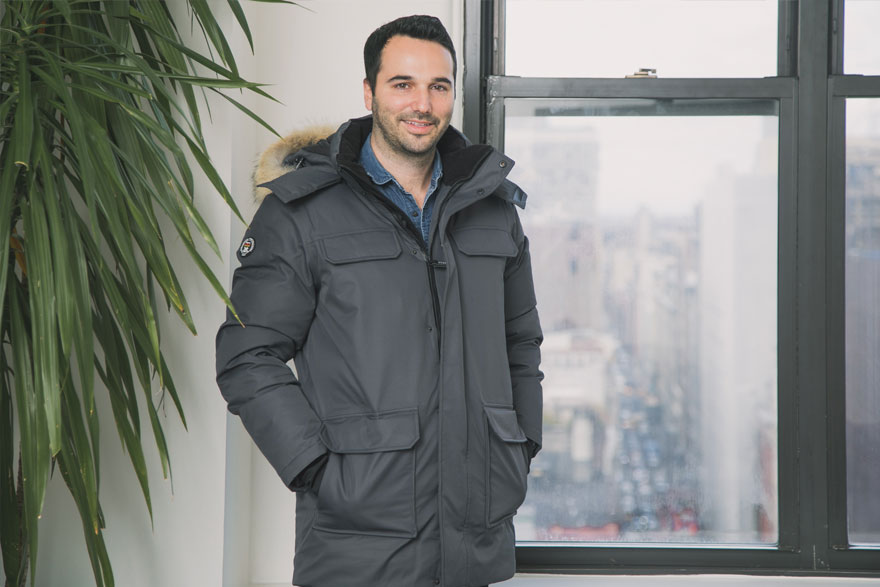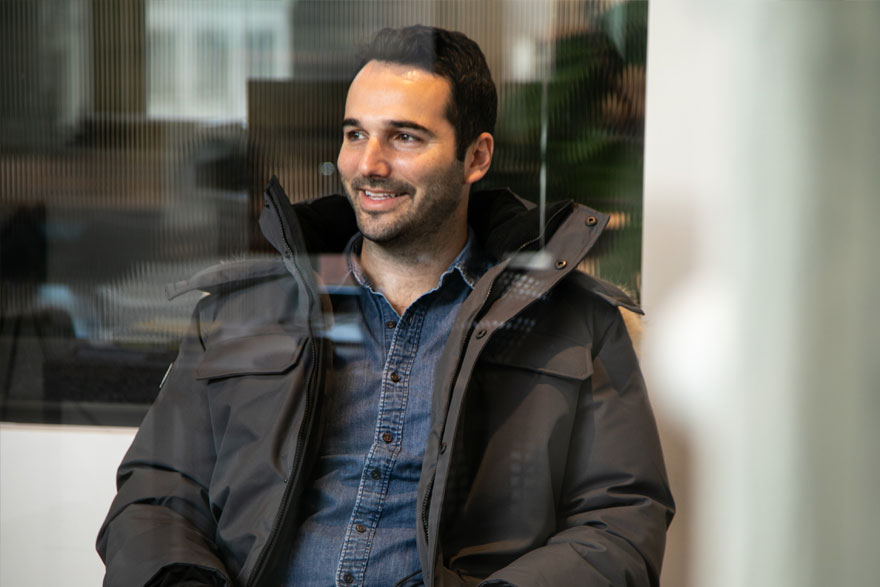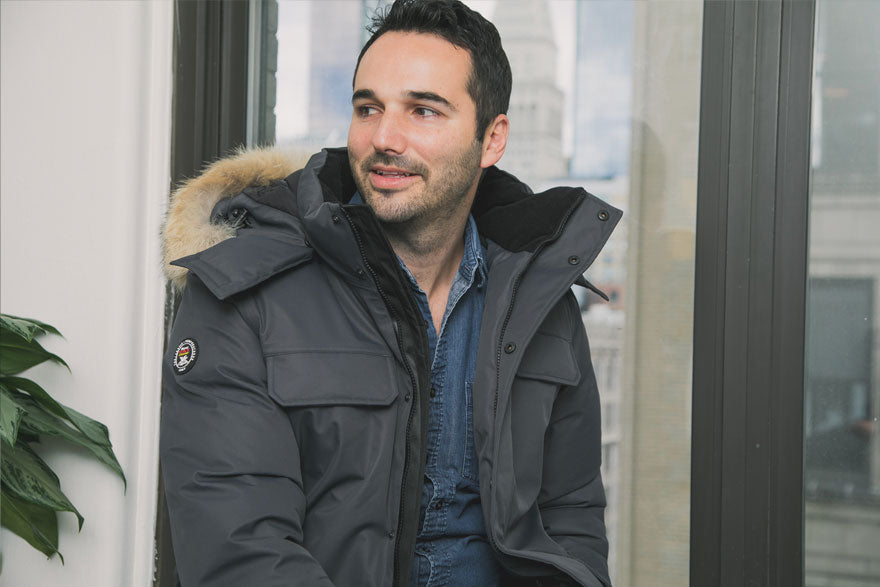When Jamie Hodari says he’s going to the office, the phrase has a lot broader meaning than when other people use it. That’s because he’s the co-founder and CEO of Industrious, a co-working company that offers office space in over 30 cities in the United States.
Founded in 2013 and named one of Inc.’s Top 15 companies to watch in 2016, Industrious “has seen its year-over-year revenue grow by five times over the past year, reaching 90% occupancy,” according to Fast Company magazine.
Maybe it’s obvious from the moniker bestowed upon his newest venture, but you don’t get to Hodari’s position without a lot of hard work. But that doesn’t mean he’s just put his head down and plowed away without thinking about what he wanted to do and how he wanted to do it.
His education includes a J.D. from Yale Law School, an M.P.P. from Harvard University, and a B.A. from Columbia University. And his resume is just as diverse. Starting with a stint as a journalist at the Times of India, he’s been a lawyer and a hedge fund analyst. Before starting Industrious he co-founded Kepler, a non-profit tasked with bringing accessible higher education to Rwanda.
With a rise to the executive level that hasn’t exactly been the customary track, Hodari instills some great advice about how to find your own path to success, how to let other people help you succeed, and the importance to downtime.

DEFINE YOUR OWN ACHIEVEMENTS
How we judge our accomplishments is not set in stone, though sometimes it feels that way. And those expectations can be like a rock tied to you. Despite reaching the top of his field at a relatively young age, Hodari knows something about this feeling—in fact, he defines success as not feeling it anymore.
“It’s about getting rid of the gnawing fear that seems to weigh so many people down,” he says. “The most successful people are the ones who are running towards something instead of away from something because it genuinely excites or fulfills them, not because they’re afraid of the consequences if they don’t.”
Look at Hodari’s track record if you need an explanation on what he talking about. He’s followed his passion from day one. After getting a law degree from one of the most prestigious universities in the world, he went halfway across the globe to work as a reporter. Not exactly a move out of Career Counseling 101.
From there he worked in three different fields and in three different capacities, before co-founding Industrious. If others are looking at him as an example of how to find your own path to success, he says maybe don’t follow what he did, but take a look at why he did it.
“I’m not sure diversification is the key to reaching your goals, so much as a genuine desire to grow and learn,” Hodari explains. “I found that I loved the first few years of a role while I felt like I was nearly drowning in new information and could barely keep up. Once it became easier, though, I was ready to try something else. Until Industrious, which has been an incredible ride, but has not become easier with time.”
The ability or desire to dig in when things get tough, and overcome the obstacles that allow you to achieve success begins long before the first day on a job or the start of a company. It kicks off with the questions you ask yourself about why you want to do something in the first place.
For instance, when Hodari was running a college scholarship program for orphans of the Rwandan genocide, at some point it became clear that the existing universities in the country were too expensive, too small, and weren’t training people to enter the workforce.
“I’ve carried with me since then the reminder that large institutions that have been doing something for a long time can often lose sight of why they do what they do,” he maintains. “In any field, the companies or organizations that stay closest to what their users really want, the problems they’re really trying to solve, end up winning.”
Because of this, Hodari believes the most important question an entrepreneur can ask him or herself before they commence a new venture is “Why am I doing this?” And then, he says, let the answer guide you in the right direction.
“If the answer has anything at all to do with what other people will think, or find impressive, you shouldn’t be doing it,” he advises. “I see a lot of people who want to start a business because they think it’s a sexy thing to do. It’s hard to explain just how not sexy it is. It’s literally the least sexy thing on earth for the first three years, and at that point 95% of startups will have failed anyway.”
But Hodari is also quick to point out that just because you are following your passion or doing something that’s for the common good, success isn’t just going to fall in your lap. Failure happens to everyone, but how you look at it is the key. ‘
“People often describe their own failures as arising from circumstance, and others’ failures as arising from something fundamental about them,” he asserts. “Don’t do that or you won’t learn anything from the failure.”
And learning from any set back is paramount because it can set you up for success in the future. “Believe in yourself enough to be honest about your own role in that failure, figure out what to learn from it,” he advises. “At some point you’ll look back and see that all sorts of good things that happened in your life down the road were enabled by that failure and the learning it sparked.”

LET OTHERS INTO YOUR BUSINESS
Once you figure out how to find your own path to success, it’s a whole other thing entirely to play a role guiding other people to their goals. With Industrious, Hodari is hoping to do that through the co-working spaces the company is creating. By designing shared offices in buildings with few walls but lots of amenities—everything from boardrooms to nap pods, party spaces to nursing rooms—the company builds an atmosphere that breeds prosperity.
“The Navy SEALs have a saying that when the @#%# hits the fan, people don’t actually rise to the occasion, they fall to the level of their training,” Hodari says. “In the same way, as a company scales, people’s behavior, ethical choices, and the way they comport themselves with their own colleagues and with others, will fall to the level of that company’s culture. If the senior leadership doesn’t model the right behavior, if the company’s values don’t hold water, eventually it will infect anything and everything the company does.”
One of the reason that Industrious has been able to scale up so fast and so successfully is because part of the culture that Hodari has ingrained at Industrious is giving autonomy to his employees—something a lot of other entrepreneurs, especially first timers, loathe to do given how hard they had to work to get the company off the ground.
“I think a lot of young leaders get inside their own head and don’t trust themselves and their team. Especially if they’ve never been an executive before,” Hodari explains. “They manage their team on process, or roll up their sleeves and try to do their colleagues’ jobs for them. Often times the most uncomfortable thing to do as a leader is to simply set out an expectation and manage people towards outcomes rather than managing them on process.”
Of course, before Hodari manages anyone, he has to hire him or her, and during that process he makes sure they’re extremely talented and attentive. From there, he indoctrinates them into the company’s vision and their role in accomplishing it. After that, he lets them loose, even allowing them to see his weaknesses so his employees can show their strengths.
“I don’t try to hide that I’m terrible at some things, and that the company wouldn’t be anywhere without a diverse team with a diverse set of experiences and a diverse set of talents,” he notes. “I think some leaders think that the way to inspire and motivate their employees is to impress them all the time, which translates to never admitting weakness or mistakes.”
Part of this approach comes from Hodari’s experience telling stories about other people. “As a journalist, you learn to listen to what people are saying, and also what they’re not saying,” he says. “The rest of this management style is purely borne out of being honest with himself and others.
“Pretending to be someone you are not is such a phony, fragile way to navigate the world,” he explains. “And in the end, not only do employees see right through it, but they learn to copy that behavior, which makes a team timid, defensive, and more focused on averting losses than on capturing big victories.”
For a company like Industrious, which is considered by many to be in the hospitality business, it’s second nature to treat employees with the respect and courtesy that they show to their clients. But having seen the lack of civility some managers show to their employees, Hodari believes it’s a skill that should be embraced by all organizations no matter their business-focus.
“I think it’s traditionally been under-developed, but I think companies in almost every sector are finally changing their tune,” Hodari says. “You can point me to almost any industry and I could argue why in the end, it’s a customer service business.”

EMBRACING DOWNTIME
You’d think taking such good care of not only his employees, but also the employees of all of Industrious’ clients, would be a never-ending job—and it could be if Hodari would let it. But instead, he sees the importance of getting away, or even getting some fresh air.
“I spend part of my workday every day outdoors,” he remarks. “Our headquarters are on Union Square and I love taking a meeting or a writing session out there.”
After hours he also makes an effort to take a break from his screens and phones. “I try to leave work by 7, then work for an hour before bed (from midnight to 1am),” he adds. “But the five hours from 7 to midnight are unplugging and relaxation time unless I have a work event or dinner meeting.”
Even though he’s so thoughtful about almost everything he does from his business to his employees to his clients, when it comes to bigger getaways, Hodari actually wings it. “I find that the demands of my job are unpredictable enough that it's sometimes easier to slip away for a vacation when I see time has opened up on my calendar, rather than planning it months in advance,” he admits.
Like the rest of us, his holidays are short breaks from the 9-to-5, including weekends at his house in Woodstock, NY. “I love to go up there to hike and fish,” he notes. “I adopted this dog who turned out to be, very unexpectedly, a squirrel hunting dog - so I've also been considering taking up squirrel hunting.”
Though work doesn’t usually allow for it, he also dreams about getting away for longer stretches. “I lived in Delhi briefly writing for the Times of India after college. I would kill to get to live in India again,” he says. “To my mind, it's just brighter, louder, and generally more stimulating than anywhere else on earth.”

